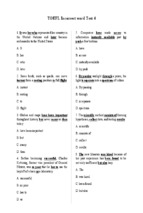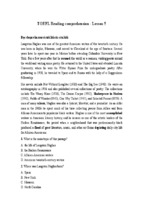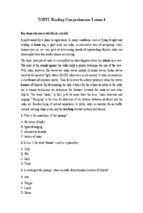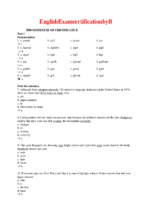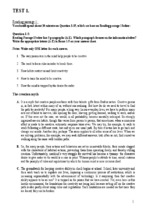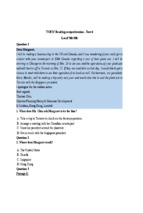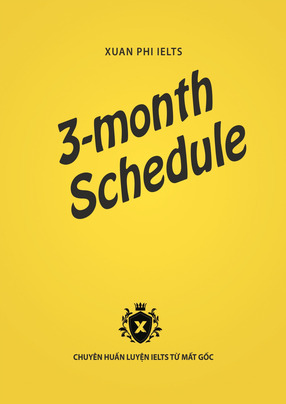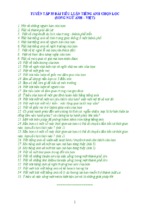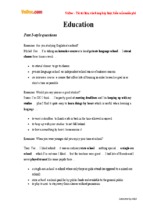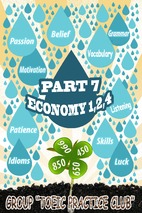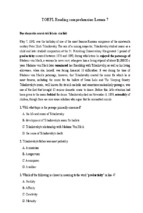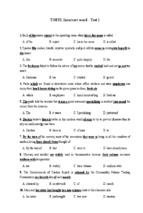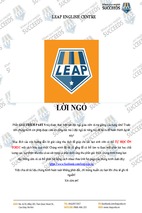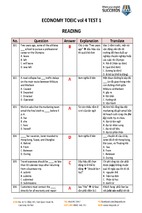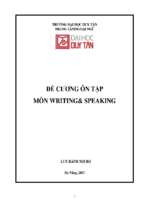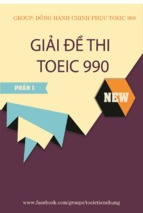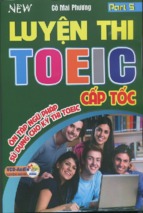Thân tặng những Chiến Binh IELTS
- Tập thể các giáo viên täi IELTS Fighter-
1
Topic Related Vocabulary
Gửi các em – những chiễn binh IETLS thân yêu!
Nhþ các em đã biết, tÿ văng không chî là một tiêu chí chçm điểm trong phæn thi
Speaking và Writing cûa IETLS mà nò cñn vô cùng trong phæn thi Listening và
Reading nĂa.Chính vì vậy mà các tài liệu liên quan về Tÿ Văng luôn đþĉc các sï
tā luyện thi IELTS “quan tåm và tâi” về rçt nhiều.
Tuy nhiên, việc học và ghi nhĆ đþĉc các tÿ văng này, đặc biệt là các tÿ văng
Academic läi là một chuyện hoàn toàn khác, đúng không các em?
Thăc ra, cò rçt nhiều cách để học và ghi nhĆ tÿ văng khác nhau. Cüng cò rçt
nhiều ląi khuyên đþĉc đþa ra cho ngþąi học khác nhau. Tuy nhiên hôm nay cô
thay mặt các thæy cô täi IETLS Fighter dành tặng các em một ląi khuyên mà theo
cô thçy hĂu ích nhçt cho việc học tÿ văng cüng nhþ câi thiện các kỹ năng trong
IETLS đò chính là: HỌC ĐI ĐÔI VỚI HÀNH
Do không cò bánh mì chuyển ngĂ cûa Doraemon nên chúng ta không thể
“nhét” một đống tÿ văng khô khan vào đæu đþĉc. Vì vậy cô khuyên các em là
hãy “cĀ tÿ tÿ”, CHĂM CHỈ ĐÓNG VÀI TRÒ QUAN TRỌNG NHẤT trong học tiếng
Anh. Châ cò bí quyết gì đặc biệt ć đåy câ, chăm chỉ + đúng phương pháp =
giỏi tiếng Anh. Vậy thôi!
Các em có đồng ý với cô không?
Theo các thæy cô, để học và ghi nhĆ một tÿ văng hiệu quâ cüng nhþ cò ích cho
việc học tiếng Anh së gồm 3 bước nhþ sau:
2
Bước 1: Hiểu
- Cái này các em chắc đã đþĉc các thæy cô (và các thæy cô täi trung tåm cüng
đã chia sê) rồi. Đó chính là các em cæn phâi ghi nhĆ nghïa, cách sā dýng, ngĂ
cânh„ cûa tÿ văng.
Cô khuyên, các em nên sā dýng các tÿ điển Anh-Anh để tra nghïa tÿ văng (đối
vĆi các em Beginner thì cò thể sā dýng tÿ văng Anh-Việt). Xem thêm các phæn
ngĂ cânh, cách áp dýng và câ collocation cûa nò cò trong tÿ điển nĂa nhé!
Khi học tiếng Anh, các em hän chế sā dýng Google translate đi nhé (có cách tra
tÿ khá hay bằng Google images cô së hþĆng dẫn sau) ^^
Bước 2: Thực hành
- Cách ghi nhĆ tốt nhçt đối vĆi một tÿ văng đò chính là áp dýng nò. Các em nên
nhĆ rằng, các em đọc nhiều læn cüng không bằng tă Nòi-Viết ra nò một læn.
Chính vì vậy, khi học tÿ văng, các em đÿng “học chay” mà hãy áp dýng nò vào
các bài viết IETLS Writing hay IELTS Speaking.
Để làm đþĉc điều này, các em hãy học TỪ VỰNG THEO CHỦ ĐỀ, nếu không học
theo chû đề thi các em së rçt khò áp dýng và làm đþĉc điều này vì„ tù mù và
chán :P
Cách thăc hành theo chû đề thì khá đĄn giân, lôi tài liệu ra và„ áp dýng thôi :v
Khi đò, quan trọng nhçt vẫn là chăm chî nhé các em!
Bước 3… 4, 5…: Nhiều lần’s
- Là thế nào nhî? Cåu nòi nghe cho trçt’ss, cho nguy hiểm?
Thăc ra, bộ não chúng ta së ghi nhĆ tốt hĄn nếu đọc nhiều læn. Chính vì vậy mà
các thæy cô täi trung tåm luôn khuyên các em là học tăng văng đò là hãy ĐỌC
và NGHE THẬT NHIỀU - Đặc biệt là ĐỌC CÂU TRẢ LỜI MẪU.
Cô xin nhçn mänh một điều là:
BÀI MẪU IETLS CHỨA ĐỰNG CÂ MỘT KHÓ BÁU
3
Nhþng tiếc là các sï tā IETLS läi thþąng bó qua điều này. Không chî Ideas,
Grammar, vocab mà cñn rçt nhiều các điều “nhó nhặt” khác mà các em cò thể
học đþĉc tÿ việc thþąng xuyên đọc các bài văn mẫu đò chính nhþ Linking
words(tÿ nối), lỗi hành văn, diễn đät các lập luận một cách logic một bài nòi-văn
học thuật.
Tçt nhiên, đọc và thăc hành nhiều læn thì càng tốt hĄn. Ngoài ra, các em cò thể
đọc thêm các tài liệu, báo chí„ nĂa nhé các em!
Giới thiệu về tài liệu:
Topic Related Vocabulary là tài liệu đþĉc biên soän dành cho các chû đề
thþąng xuçt hiện trongpart 3 cûa Speaking và Task 2 cûa Writing. Mỗi chû đề së
cung cçp các tÿ và cým tÿ văng phổ biến thông quamột đoän ví dý (đoän
văn).
Ngoài ra, tài liệu cñn cung cçp thêm các cåu hói đi kèm để giúp các em cò thể
luyện tập vĆi tÿng chû đề riêng và ghi nhĆ tÿ văng tốt hĄn.
Hướng dẫn sử dụng tài liệu hiệu quâ:
Các em chọn một topic mà mình đang dă đðnh học, đọc nhiều læn (đọc to – ghi
åm để kiểm tra pronunciation cûa bân thån). Sau đò hãy sā dýng các tÿ văng
trên và luyện tập vĆi bộ cåu hói đi kèm đến khi thành thäo.
Lþu ý: Luyện tập thật kỹ tÿng chû đề đến khi thật thành thäo mĆi chuyển sang
chû đề tiếp theo.
Tài liệu cò sā dýng nguồn cûa IELTSDori
Một số tài liệu đi kèm mà các em nên học:
- Tài liệu Vocabulary for IETLS từ A-Z:https://goo.gl/WDT24P
- Tài liệu IDEAS for IELTS topics: https://goo.gl/WhS0oN
4
Tổng hợp 1 số chia sẻ hay của IELTS Fighter
Lộ trình tự học IELTS Online (free) từ 0-5.0: https://goo.gl/SqedL0
Lộ trình tự học IELTS Online (free) từ 5.0-6.5: https://goo.gl/8T5ck7
PhþĄng pháp tự học IELTS ở nhà toàn tập: https://goo.gl/dsyd4x
PhþĄng pháp tự học IELTS Speaking ć nhà: https://goo.gl/SrEqik
Tài liệu IELTS từ A-Z để tă học ć nhà: https://goo.gl/mT20bk
Các tài liệu tă học giúp tang từ 4.0-7.5 IELTS: https://goo.gl/U6UgDf
Các chia sê khác về IELTS –phương pháp học IELTS: https://goo.gl/ZBu4bp
Kênh Youtube cûa IELTS Fighter:https://goo.gl/lK7QMZ
Trong tháng 3 này, IELTS Fighter khai trương 2 cơ sở mới täi Hà Nội và TP HCM
vĆi rçt chþĄng trình cüng nhþ khuyến mãi hçp dẫn nhþ thi thử IETLS 4 kỹ năng
miễn phí – bốc thăm giâm học phí – tặng sách. Các em đÿng bó lĈ nhé!
Lịch khai giâng các lĆp luyện thi IELTS täi IELTS Fighter: https://goo.gl/j1v73m
IELTS Fighter - The Leading IELTS Training Center in VN
Cơ sở Hà Nội
CĄ sć 1: 254 Hoàng Văn Thái – Thanh Xuân – Hà Nội
CĄ sć 2: 44 Trần Quốc Hoàn – Cầu Giấy– Hà Nội
CĄ sć 3: 410 Xã Đàn – Đống Đa– Hà Nội
Cơ sở TP HCM
CĄ sć 4: 350 Đường 3/2 – Quận 10 – TP HCM
Website: http://ielts-fighter.com/
Fanpage: https://www.facebook.com/ielts.fighter/
Hotline: 0963 891 756
5
#1: Sports
Professional athletes
train their mind
to
get rid of
negative thoughts
and the
fear of failure
while at the
same time they are able to
maintain their concentration.
Exercise helps people to
have a sound
mind
and
build up mental strength.
It is not rare for athletes to
have a bad
day
which
affects their performance
for no obvious
reasons. In days like that, there is a
slim chance of doing well.
Keeping their mind on
the game
requires immense
powers of complete concentration.
Peak performance
is usually a combination
of
determination
and motivation.
In order to
achieve a goal
you should
feel
motivated
and you should not let
distractions disturb
your focus.
Questions
How important is exercise for people’s health?
What kind of personality traits should a professional athlete have in
order to succeed?
Do you believe in talent or hard work?
Is psychology important to an athlete’s performance?
6
Comment [A1]: Rèn luyện trí óc
Comment [A2]: Loại bỏ những suy nghĩ tiêu cực
Comment [A3]: Sợ thất bại
Comment [A4]: Duy trì khả năng tập trung
Comment [A5]: Có tinh thần khỏe mạnh
Comment [A6]: Nâng cao sức mạnh tinh thần
Comment [A7]: Có một ngày tồi tệ
Comment [A8]: ảnh hưởng tới phong độ thi đấu
Comment [A9]: khó có thể thi đấu tốt
Comment [A10]: tập trung vào
Comment [A11]: yêu cầu sự tập trung vô cùng
lớn
Comment [A12]: phong độ đạt đỉnh cao
Comment [A13]: sự quyết tâm
Comment [A14]: đạt được mục tiêu
Comment [A15]: cảm thấy có động lực
Comment [A16]: sự xao nhãng làm giảm sự tập
trung
#2: Sports and School Education
Physical Education
should be
an essential part of the
school curriculum
as not only does it enhance the
pupils’
well-being
through
healthy exercise
but
also it promotes the
importance of exercise as a healthy way
of living later in life.
Through
fitness
students
learn self-discipline
and
they
build self-respect
while maintaining a
healthy
body in a healthy mind.
Questions
Comment [A17]: giáo dục thể chất
Comment [A18]: 1 phần quan trọng trong
chương trình học
Comment [A19]: Sự khỏe mạnh
Comment [A20]: Bài tập sức khỏe
Comment [A21]: Tầm quan trọng của việc tập
thể dục cho một cuộc sống khỏe mạnh sau này
Comment [A22]: Sự cân đối
Comment [A23]: Học được tính kỉ luật
Comment [A24]: Lòng tự trọng
Comment [A25]: Một cơ thể khỏe mạnh trong
một trí óc khỏe mạnh
How important is physical education in schools?
Many people believe that physical education in schools is a waste
of time and it should be a subject of choice. Do you agree?
#3: Sports and Money
Many people believe that footballers
do not deserve the
exorbitant amounts they are paid
in relation to doctors and
other professions.
Commercial sponsorship deals
and
astronomically high
transfer fees
lead to
fierce competition
among
athletes who are
under incredible pressure
to do well.
Financial rewards
lead athletes
to resort to steroids in
order to obtain success
as they
face much tougher
competition
Due to extreme competition and pressure,
taking drugs which
radically improve an athlete’s performance
seems to be the
only option for professionals.
7
Comment [A26]: Không xứng đáng được trả
mức lương cao như vậy
Comment [A27]: Những vụ thương lượng
Comment [A28]: Phí chuyển nhượng cao
Comment [A29]: Sự cạnh tranh khốc liệt
Comment [A30]: Chịu áp lực quá lớn
Comment [A31]: Phần thưởng tiền
Comment [A32]: Cố gắng mọi cách để chiến
thắng
Comment [A33]: Dùng thuốc kích thích phong
độ thi đấu
The subjection of professional athletes to blood tests in order to
detect traces of drugs
is an indication that
the true
meaning of sport is clearly lost.
Questions
Comment [A34]: Việc các vận động viên thử
máu để điều tra dấu vết của thuốc kích tích không
thành
Comment [A35]: Ý nghĩa thực sự của thể thao
đã mất
Nowadays, sports have to do more with business and money than
with higher values and health. What do you think?
How has the involvement of drugs in sports affected the way people
see sports?
#4: Competitiveness
Some people believe that teachers should
boost
competitiveness among students
because
competition
stimulates motivation
but others
are
against encouraging competition
because it
can
lead to negative feelings of low self-image.
Healthy competition
motivates
students to
reach
their full potential.
Students that
succeed in achieving
something
feel a
sense of accomplishment
that boosts their self-confidence.
Competition does not always
promote team spirit
and
thus, weaker students may
be laughed at
and
suffer
from embarrassment.
Competition can have a positive impact on students that
are
full of determination
but a negative impact on
students who
lack self-confidence
as they will
feel
stressed about
doing well and
feel a failure
when
they don’t succeed.
Questions
8
Comment [A36]: Nâng cao tính cạnh tranh giữa
các học sinh
Comment [A37]: khơi dậy động lực
Comment [A38]: không khuyến khích việc cạnh
tranh
Comment [A39]: dẫn đến những cảm giác tiêu
cực về sự yếu kém của bản thân
Comment [A40]: cạnh tranh lành mạnh tạo
động lực
Comment [A41]: phát huy hết tiềm năng
Comment [A42]: đạt được
Comment [A43]: có cảm giác đạt được thành
tựu
Comment [A44]: khuyến khích tinh thần đồng
đội
Comment [A45]: bị chê cười và bị đè nặng bởi
sự xấu hổ
Comment [A46]: quyết tâm cao độ
Comment [A47]: thiếu tự tin
Comment [A48]: cảm thấy áp lực về
Comment [A49]: cảm thấy thất bại
Many people believe that school should encourage
competitiveness among students. Do you agree?
How can competitiveness help students with low self esteem?
Students with a lack of self confidence can suffer from
competitiveness in schools. What could be done to avoid that?
9
#5: Job Market
There is
a rising demand for
web developers.
In order to
compete in the job market
you need to
be
well equipped for
the position you want and
have
suitable qualifications.
Only the
basic requirements
will not get you very far in
relation to
employment prospects.
In order to
secure a job
you have to impress
potential
employers
not only with your
academic
achievements
and
work experience
in your field but
also with your
social skills.
A desirable job helps you
gain independence.
Being suited to a job
in terms of qualifications increases
your
prospects for promotion.
Questions:
Young adults should choose a field of study according to the
demands of the job market and not according to their preferences.
Do you agree?
Some school graduates prefer to find a job right after school instead
of going to university. What are the advantages and disadvantages
of that?
What are the benefits of a good education?
10
Comment [A50]: nhu cầu tăng cao cho
Comment [A51]: cạnh tranh ở thị trường lao
động
Comment [A52]: được trang bị tốt
Comment [A53]: bằng cấp phù hợp
Comment [A54]: những yêu cầu cơ bản
Comment [A55]: những triển vọng trong công
việc
Comment [A56]: đảm bảo công việc
Comment [A57]: nhân viên tiềm năng
Comment [A58]: thành tích học tập
Comment [A59]: kinh nghiệm làm việc
Comment [A60]: các kĩ năng xã hội
Comment [A61]: tự lập
Comment [A62]: phù hợp với công việc
Comment [A63]: triển vọng thăng tiến
#6: Foreign Languages
People that
excel in foreign languages
usually have a
successful career.
Being able to speak several foreign languages can help your
acceptance to
scholarship programmes.
Students that are
exposed
to two or more different foreign
languages
acquire better communicative
abilities
and
have access to two different worlds.
Some people have an
innate ability to learn
languages
easily and this ability usually opens up
career
opportunities
as it
makes a favourable impression to
potential employers.
When a student tries to
immerse himself/herself in a
language, s/he should avoid using the
dominant
language
and find ways to
maximise his/her exposure
to
the new language.
Being
fluent
in a foreign language is not only
a
medium of communication
but also a medium that
surpasses
language barriers.
The school system should
reinforce the knowledge of foreign
languages
by making them
compulsory
and
by
new teaching methods
that will make learning easy
and fun.
People fluent in two or more different languages learn
to
embrace diverse cultures.
People that are able to speak foreign languages usually
have
high self-esteem.
Questions:
How important is to know foreign languages today?
How can the knowledge of foreign languages help you find a job?
11
Comment [A64]: xuất sắc trong học việc học
ngoại ngữ
Comment [A65]: các chương trình học bổng
Comment [A66]: được tiếp cận
Comment [A67]: có kĩ năng giao tiếp tốt hơn
Comment [A68]: tiếp cận tới nhiều thế giới khác
nhau
Comment [A69]: khả năng bẩm sinh học ngoại
ngữ
Comment [A70]: các cơ hội nghề nghiệp
Comment [A71]: tạo ấn tượng tốt với những
nhân viên tiềm năng
Comment [A72]: nghiền ngẫm học một ngôn
ngữ
Comment [A73]: ngôn ngữ thành thạo hơn
Comment [A74]: tối đa việc tiếp cận tới
Comment [A75]: thành thạo, trôi chảy
Comment [A76]: khả năng giao tiếp vừa phải
Comment [A77]: rào cản ngôn ngữ
Comment [A78]: củng cố kiến thức về ngoại ngữ
Comment [A79]: bắt buộc
Comment [A80]: những phương pháp giảng dạy
mới
Comment [A81]: học hỏi các nền văn hóa đa
dạng
Comment [A82]: lòng tự trọng cao
12
#7: Workplace
People should
get ahead
in the workplace
only
through hard work,
punctuality, and talent.
A
pleasant working environment
makes a huge
difference
to employees as it
generates positive
feelings
and
increases productivity.
Employees shouldn’t be
treated as commodities
by their
bosses; employers should be able to
promote teamwork and
team spirit
among employees as this will trigger
their
motivation.
If a company has
high expectations
from its employees
then, it should
reward them for good performance; this
will
boost their creativity
and
personal
motivation
even more.
Questions:
In what ways and to what extent does the environment of the
workplace affects employees?
What are the consequences when negativity prevails in the
workplace?
13
Comment [A83]: tập trung, chú trọng
Comment [A84]: thông qua làm việc chăm chỉ và
đúng giờ giấc
Comment [A85]: môi trường làm việc thoải mái
tạo một sự khác biệt lớn
Comment [A86]: tạo ra những cảm giác tích cực
Comment [A87]: nâng cao năng suất
Comment [A88]: bị đối xử như hàng hóa
Comment [A89]: khích lệ việc làm việc nhóm và
tinh thần đồng đội
Comment [A90]: động lực
Comment [A91]: kì vọng cao
Comment [A92]: tặng thưởng nếu làm việc tốt
Comment [A93]: khích lệ sự sáng tạo
Comment [A94]: động lực cá nhân
#8: Equality
Several employers are
reluctant to employ women
due
to
discrimination, fear, and prejudice.
Women do not usually
receive the same treatment as their
male counterparts,
although they are
equally
capable
and
deserve
to be
taken more
seriously.
Women face discrimination in the workplace
and
they
experience several obstacles
from
sexual
harassment
to
being overlooked
as an employee.
The salaries of men and women in the same company are not
equal; women
are usually underpaid
although they do
the same kind of job.
Questions:
Men and women are said to be excluded from specific jobs due to
their gender. Is this fair in your opinion?
Are women treated differently in the workplace? If yes, to what
extent and in what ways?
14
Comment [A95]: do dự khi tuyển phụ nữ
Comment [A96]: sự phân biệt đối xử, nỗi sợ và
định kiến
Comment [A97]: nhận sự đối xử giống như đàn
ông
Comment [A98]: có khả năng tương đương
Comment [A99]: xứng đáng
Comment [A100]: được xem trọng hơn
Comment [A101]: phụ nữ gặp phải sự phân biệt
đối xử tại nơi làm việc
Comment [A102]: trải qua 1 vài trở ngại
Comment [A103]: quấy rối tình dục
Comment [A104]: bị xem thường, không được
quan tâm chú ý đến
Comment [A105]: thường bị trả ít hơn
#9: Media
In the
ever-changing world of technology
there is
an
ever-increasing demand for new stories.
There have been some
radical changes in the past few
years
concerning
the role of the media
and the
way
information is transmitted
Media and journalism have become
highly competitive
markets
and as a result
credibility
is
rare;
unscrupulous journalists
publish
misleading
stories
with
sensational
headlines
and
gruesome details
that
distort the
truth.
Trying to keep track of the latest events
becomes almost
impossible.
Journalists nowadays use
ambiguous language
and
no
fact or discretion
as they don’t hesitate to
offend
people
with
disturbing images
and what not, in order
to gain profit.
If you don’t
read between the lines, you
run the risk
of
being misled.
Questions:
Media studies should be a compulsory subject in schools. Do you
agree?
The role of the media is to inform people objectively; however,
nowadays this is far from the case. Discuss.
15
Comment [A106]: một thế giới của công nghệ
luôn biến đổi
Comment [A107]: nhu cầu với những câu
chuyện mới tăng cao hơn bao giờ hết
Comment [A108]: những thay đổi mạnh mẽ
trong vài năm vừa qua
Comment [A109]: vai trò của truyền thông
Comment [A110]: thông tin được truyền đi
Comment [A111]: thị trường cạnh tranh cao
Comment [A112]: sự thật thì hiếm
Comment [A113]: nhà báo vô đạo đức
Comment [A114]: những câu chuyện bịa đặt lừa
dối
Comment [A115]: tiêu đề giật gân
Comment [A116]: chi tiết ghê rợn
Comment [A117]: bóp méo sự thật
Comment [A118]: cố gắng bắt kịp những sự
kiện mới nhất
Comment [A119]: ngôn ngữ trừu tượng
Comment [A120]: sự thật hay nguồn dẫn thông
tin
Comment [A121]: hạ thấp danh dự người khác
Comment [A122]: bôi nhọ hình ảnh
Comment [A123]: đọc thông tin một cách kĩ
lưỡng
Comment [A124]: có nguy cơ
#10: Advertising
Advertising not only
helps people to make
choices
among products through
informing them about
new things, but also
it creates a need
in people to buy
something.
In this
increasingly materialistic society, the
main
purpose of advertising is to sell; therefore, it is not rare for
advertisers to resort to
dishonest tactics
in order
to
increase sales.
It is very
difficult for people to escape influence
since
they are
constantly bombarded by
adverts
which
create desires
and
affect buying
habits.
Governments should
put restrictions
on
the
deceptive use of marketing in order to promote
sales
By
running constant advertising
campaigns
which
target a particular age group,
advertisers create needs to this group for
expensive or even
overpriced
The
increasing materialism
enhanced by advertising
affects teenagers the most who try to
follow
fashion
and
make a positive impression
in order
to
be accepted by their peers.
Nowadays,
emphasis is put on looks not on
character
and everyone is
judged by his/her
appearance.
People
feel more self- confident
when they
keep up
with the latest trends
and
improve their self-image.
Comment [A125]: giúp mọi người đưa ra sự lựa
chọn
Comment [A126]: thông báo cho họ những
thông tin mới
Comment [A127]: nó tạo ra nhu cầu
Comment [A128]: xã hội ngày càng ưa vật chất
Comment [A129]: mục đích chủ yếu của quảng
cáo là bán hàng
Comment [A130]: thủ thuật dối trá
Comment [A131]: tăng doanh số
Comment [A132]: khó để mọi người tránh được
ảnh hưởng
Comment [A133]: liên tục bị quảng cáo tấn
công
Comment [A134]: tạo ra nhu cầu
Comment [A135]: ảnh hưởng tới hành vi mua
bán
Comment [A136]: giới hạn, hạn chế
Comment [A137]: quảng cáo lừa dối để thúc
đẩy
Comment [A138]: liên tục tổ chức chiến dịch
quảng cáo
Comment [A139]: nhắm tới 1 đối tượng tuổi cụ
thể
Comment [A140]: đắt đỏ hoặc thậm chí giá quá
cao
Comment [A141]: chủ nghĩa vật chất tăng cao
Comment [A142]: theo đuổi phong cách
Comment [A143]: tạo ấn tượng tốt
Comment [A144]: để được bạn bè chấp nhận
Comment [A145]: vẻ bề ngoài được chú trọng
hơn là phẩm chất
Comment [A146]: được đánh giá bởi vẻ bề
ngoài
Comment [A147]: thấy tự tin hơn
Comment [A148]: theo kịp những xu thế mới
nhất
Comment [A149]: cải thiện hình ảnh bản thân
16
Advertising is
a powerful tool for influencing people
but
people should be very careful not to fall victims of
misleading
perceptions.
Comment [A150]: một công cụ hiệu quả gây
ảnh hưởng tới người khác
Comment [A151]: những nhận thức sai lầm
Questions:
What is the role of advertising?
Do you think that there should be a limit on advertising?
In what ways is advertising trying to inform us about the latest
products?
How do adverts promote materialism?
In what ways and to what extent do adverts influence people?
#11: Television
Television is an
inexpensive form of entertainment; this makes
it
the primary source of entertainment
and for some
people the only one.
People that watch TV too many hours a day run the risk of
becoming
couch potatoes
something that has
devastating results to one’s health.
Damage to young people’s minds is said to be irreparable; children
shouldn’t watch TV as it
has a negative influence on
It is
the
parents’ responsibility to monitor and control the
children’s viewing.
Television has become a
part of our daily lives
since the
majority of people watch TV
on a daily basis.
The
exposure to TV advertisements
is major leading
people to
desire things that are beyond their means
in
order to
keep up with the latest trends.
Comment [A152]: một dạng giải trí không đắt
đỏ
Comment [A153]: nguồn giải trí chính
Comment [A154]: những người chỉ ngồi trong
nhà xem quá nhiều TV
Comment [A155]: có ảnh hưởng tiêu cực tới
Comment [A156]: trách nhiệm của bố mẹ để
làm gương và kiểm soát cách nhìn nhận của trẻ
Comment [A157]: một phần trong cuộc sống
hằng ngày
Comment [A158]: hằng ngày
Comment [A159]: tiếp cập tới quảng cáo trên
TV
Comment [A160]: muốn những thứ vượt quá
công dụng thật của chúng
Comment [A161]: theo kịp những xu hướng
mới nhất
17
Since television
exerts a huge influence on
people,
governments manipulate public opinion
without
viewers realising it.
It is true that some TV programmes
insult viewers’ intelligence,
but unfortunately TV
imitates our society.
The
advertising revenue
from TV adverts is enormous,
therefore TV not only
fulfils the need
of entertainment but
it also creates a need for new products.
The
lack of communication and conversation
among
people lies in the fact that everyone is watching TV programmes
and is
alienated
from his/her environment.
It is quite an advantage that through television, people have the
opportunity
to access
not only important
worldwide
events
but also
different cultures.
The potential to change and form the public opinion gives television
immense power.
Television not only
mirrors our society
but it also has
a
great impact on
Questions:
Television is considered a form of entertainment that is accessible to
everyone. What are the dangers a person faces when s/he watches
TV many hours a day?
Children watch television too many hours a day. What are the
consequences? What can be done about this problem?
Television is said to be a window to the world. However, the more
you watch, the more alienated you become from society. Discuss.
#12: Globalisation
18
Comment [A162]: tạo ra sự ảnh hưởng lớn tới
con người, chính phủ thao túng quan điểm của công
chúng
Comment [A163]: hạ thấp nhận thức của khán
giả
Comment [A164]: phản ánh xã hội của chúng ta
Comment [A165]: doanh thu quảng cáo
Comment [A166]: đáp ứng nhu cầu
Comment [A167]: thiếu sự giao tiếp và trò
chuyện
Comment [A168]: bị xa lánh
Comment [A169]: tiếp cận
Comment [A170]: những sự kiện toàn thế giới
Comment [A171]: những nền văn hóa khác
nhau
Comment [A172]: phản ánh xã hội của chúng ta
Comment [A173]: có tác động lớn đến
There are many people who
oppose
globalisation
because
it weakens and threatens
national identities.
It is
crucial
that we
keep in touch with our
roots
and
preserve the diversity of our culture.
It is
vital
to
keep our traditions
alive
and
develop a sense of national identity.
Due to globalisation, not only all kinds of
products are
accessible
to all people but also
exposure to languages
and education
is easier and more convenient than ever.
Internet has
greatly altered the way we perceive the
world
and as a result, people have
developed a global
perspective.
The influence of more dominant countries has spread
worldwide
wiping out
cultural differences that
gradually
cease to exist.
Exposure to different cultures is beneficial as it broadens
peoples’ minds and horizons
but this doesn’t mean that they
will
neglect the customs and traditions
of their own
country.
Let’s not underestimate the significance of
national
achievements, events, and people that
shape a nation.
Cultural heritage should be passed down from generation to
generation
as this will prevent the cultural differences among
nations from being
obliterated.
Globalisation has a
deep social, cultural, economic and
environmental impact
that
affects all countries
but
especially the less promoted.
It is inevitable to avoid
the effects of globalisation, therefore
instead of worrying about how
global change affects
us,
we should
learn from the mistakes or successes
of the
past.
19
Comment [A174]: phản đối xu thế toàn cầu hóa
Comment [A175]: nó đe dọa đến những bản sắc
riêng của các quốc gia.
Comment [A176]: Quan trọng
Comment [A177]: Giữ được nguồn gốc gia đình
Comment [A178]: Bảo tồn sự đa dạng văn hóa
Comment [A179]: Quan trọng
Comment [A180]: Duy trì truyền thống
Comment [A181]: Phát huy bản sắc dân tộc
Comment [A182]: Các sản phẩm có thể được
tiếp cận
Comment [A183]: Sự lan truyền các ngôn ngữ
và giáo dục
Comment [A184]: Thay đổi rất nhiều cách
chúng ta nhận thức thế giới
Comment [A185]: Nhận thức mang tính toàn
cầu
Comment [A186]: Sự ảnh hưởng của các quốc
gia mạnh trên thế giới đã xóa đi
Comment [A187]: Không còn tồn tại
Comment [A188]: Việc tiếp cận đến nhiều nền
văn hóa khác nhau giúp con người mở mang tầm
hiểu biết
Comment [A189]: Lãng quên phong tục tập
quán truyền thống
Comment [A190]: Hãy đừng đánh giá thấp tầm
quan trọng của những thành tựu quốc gia
Comment [A191]: Tạo nên một quốc gia
Comment [A192]: Di sản văn hóa nên được
truyền từ thế hệ này qua thế hệ khác
Comment [A193]: Bị xóa sạch
Comment [A194]: Có ảnh hưởng sâu sắc về xã
hôi, văn hóa, kinh tế và môi trường , điều này ảnh
hưởng tới tất cả các quốc gia
Comment [A195]: Không thể tránh được
Comment [A196]: Thay đổi toàn cầu ảnh hưởng
tới
Comment [A197]: Học hỏi từ những lỗi lầm và
thành công
We cannot live in the past as change is unavoidable, but if we
get
a good general knowledge of
our differences and
learn
to take pride in
our national achievements,
the
effect of world events
on our national identity won’t be so
harmful.
Questions:
What are the benefits of globalisation?
What are the negative aspects of globalisation?
How does global change affect people?
In what ways are smaller countries influenced by more dominant
ones?
20
Comment [A198]: Chúng ta không thể cứ sống
mãi với quá khứ vì sư thay đổi là tất yếu
Comment [A199]: Lượng kiến thức chung tốt
Comment [A200]: Tự hào
Comment [A201]: ảnh hưởng của các sự kiện
thế giới
- Xem thêm -


